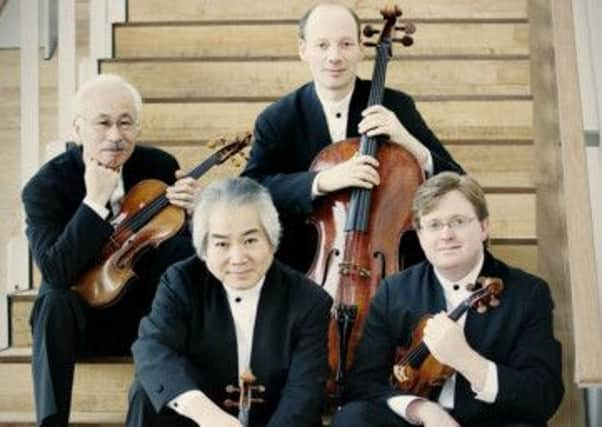Tokyo String Quartet heads to East Neuk Festival for European swansong


Three days later, at its resident base at Yale University, the 44-year-old ensemble will perform for the very last time.
The classical music world was rocked last year when the Quartet – famous for its seminal Beethoven recordings and award-winning discs of Haydn and Brahms – announced its intention to disband after nearly half a century of international success.
Advertisement
Hide AdThe decision was triggered by the announcement that the two longest-serving members – violist and founding member Kazuhide Isomura, and second violinist Kikuei Ikeda, both in their sixties – would be retiring this summer. According to British-born cellist, Clive Greensmith, the time was right to call it a day.
“Yes, of course, there was a moment when I thought we should go on,” explains Greensmith, who replaced the original cellist Sadao Harada in 1999. “But there’s a 20-plus year gap between Martin Beaver [1st violinist] and me and the older two players. It was getting more difficult to do touring and to keep what we had, never mind adding new repertoire.
“It’s a very intense way to earn a living. I felt 14 years was more than I expected to be there, and it seemed right, at 46, for me to face a different challenge.” Greensmith and Beaver are moving to Los Angeles to co-direct the string programme at the city’s prestigious Colburn School of Performing Arts.
So what prompted such a legendary outfit to choose Fife for its European swansong? According to Greensmith, it was simply a combination of the ENF’s early planning and, in the festival’s case, a stroke of luck.
“Because their invitation came in so early on, we were happy to accept it and to plan the rest of our UK touring – which includes Aldeburgh, Deal and Cambridge – around the East Neuk date, not knowing at the time that it would be our last UK concert,” Greensmith explains. “None of us had been there before, but we have good memories of playing in Perth, Glasgow and Edinburgh, so we’re really looking forward to it.”
In Crail Church on Wednesday, the four regulars will be joined by cellist David Watkin in a performance of Schubert’s Quintet in C. But not before they, themselves, present a classic Tokyo combination of Mozart’s Hoffmeister Quartet and Webern’s Quartet in E.
Advertisement
Hide AdMany put the unique Tokyo sound down to the liquid homogeneity that exists between its players, and which took root when the four original members studied together in their native Japan – where the Quartet was effectively formed in 1969 – before transferring en masse to New York’s Julliard School.
Greensmith acknowledges that signature cohesion of the early days, but reckons that a greater sense of freedom emerged with the successive appearance of new personnel – not least the arrival of 1st violinist Peter Oundjian in 1985, now music director of the RSNO – and with it new approaches.
Advertisement
Hide Ad“When I listen to early recordings I’m struck by the remarkable unanimity and discipline of the ensemble. It was tough for me coming into a group that had already passed its 25th birthday, especially as my predecessor had been there from the very beginning. There is more freedom now, but still, if you go out on a limb as an individual, it may have to be discussed.”
That cohesiveness is helpedby the four Stradivarius instruments – all once owned by Paganini – that have been on loan to the Quartet through the Nippon Music Foundation since 1995. “The cello is a glorious instrument, with a burnished resonance that is very seductive.” But this week’s performance will be the last featuring the instruments. “They have to be handed back the day after East Neuk. They’ll go to another quartet; we don’t know which one yet,” says Greensmith.
If he has any regrets, it’s about repertoire the Quartet didn’t explore. “I’d like to have done Berg’s Lyric Suite, and I wish we had played Schoenberg’s Second Quartet more than we did.” And what will he miss most? “I’ll miss the quality of repertoire, and the wonderful partnerships with wonderful audiences,” Greensmith admits. “That will be tough.”
KEN WALTON
• The East Neuk Festival runs from 3-7 July. www.eastneukfestival.com